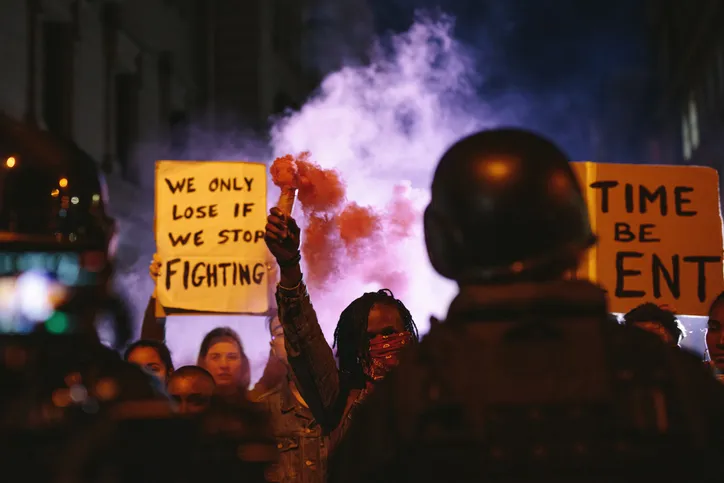Your Right to Peacefully Protest Is Under Attack Across America
Share
Explore Our Galleries
Breaking News!
Today's news and culture by Black and other reporters in the Black and mainstream media.
Ways to Support ABHM?
By Shaya Tayefe Mohajer, Word in Black
A protest against a Confederate statue in small-town Texas and a Supreme Court decision against a Black Lives Matter activist are warning signs about the health of the right to assemble.

When the right to protest disappears, so does your democracy. While egregious examples abound of First Amendment rights being trampled recently, one case from Texas is a harsh reminder of how fragile constitutional rights have become in the U.S.
It began on a quiet Sunday in August 2020, just months after the murder of George Floyd. A few dozen activists in Gainesville, a small town about 70 miles north of Dallas, held an approved, peaceful march calling for the removal of two Confederate statues, one of which is outside the Cooke County courthouse.
On the appointed day, a few dozen protesters walked a 12-block route in about 11 minutes, according to court filings. No one was injured. No property was damaged. Traffic flowed unimpeded. The march had official approval, law enforcement was aware of it and officers were present at the scene. The march began and ended without incident.
Yet despite the Constitution’s guarantee of the right to peaceful assembly, authorities issued arrest warrants for three protest organizers three days after the protest. Even though the organizers had official permission to march, the warrants accused them of “obstructing a highway or other passageway,” a misdemeanor.
Learn about the protests of the past in this virtual exhibit.
Find more Breaking News here.









Comments Are Welcome
Note: We moderate submissions in order to create a space for meaningful dialogue, a space where museum visitors – adults and youth –– can exchange informed, thoughtful, and relevant comments that add value to our exhibits.
Racial slurs, personal attacks, obscenity, profanity, and SHOUTING do not meet the above standard. Such comments are posted in the exhibit Hateful Speech. Commercial promotions, impersonations, and incoherent comments likewise fail to meet our goals, so will not be posted. Submissions longer than 120 words will be shortened.
See our full Comments Policy here.